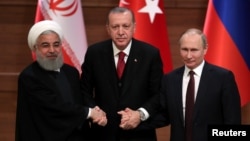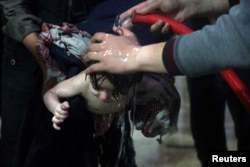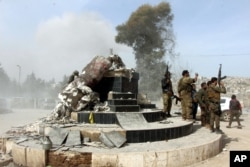Turkish President Recep Tayyip Erdogan was quick to join in the condemnation of Saturday's alleged chemical weapons attack in Syria that killed dozens of civilians. But unlike many of Turkey's western allies, Erdogan refrained from publicly criticizing the Damascus regime's key backers: Tehran and Moscow.
According to local reports, Erdogan spoke Monday with his Russian counterpart Vladimir Putin, where he raised "concerns" over Saturday's attack in eastern Ghouta's Douma district, emphasizing the need to avoid civilian causalities. Russian Foreign Minister Sergey Lavrov claimed Monday there was no evidence of a chemical weapons attack.
While Erdogan publicly refrained from attacking Moscow, he instead turned his fire on his western allies, accusing them of being insincere in their condemnation of Damascus for the Saturday attack. Syria has denied using chemical weapons throughout the seven-year conflict, including the most recent suspected chemical attack Saturday.
"Erdogan is in a tight spot," said political scientist Cengiz Akar. Allegations of a Syrian regime chemical attack comes after Wednesday's summit in Ankara where Erdogan was pictured holding hands with Damascus' key backers, the Iranian and Russian presidents, claiming success in their cooperation in working to resolve the Syrian civil war.
At a press conference with Putin at Wednesday's summit, Erdogan said he planned for the two countries' military forces to build a hospital for refugees from Ghouta. Iran, Turkey and Russia have been cooperating to bring an end to the civil war under what is the dubbed the "Astana process."
Analysts claim Saturday's attack has put a spotlight on the contradictory position of Turkey's Syria policy.
"Ankara is seen as one of the main supporters of the Syrian rebels, and Ankara's new partner and friend Moscow is bombing these individuals. It's totally unsustainable," said political scientist Akar. Ankara leverage over the Syrian rebels is viewed as invaluable by Moscow in its efforts to bring an end to the conflict.
Analysts suggest Ankara's continued cooperation with Moscow over Syria is due, in part, to Russia's tacit support of the Turkish-led military offensive against the YPG Kurdish militia in the Syrian enclave of Afrin. Ankara accuses the militia of being terrorists linked to a Kurdish insurgency inside Turkey.
"The unique constant of Turkish foreign policy not only in Syria [but] in the entire Near East, is an anti-Kurdish stance. That is the only policy, everything else is negotiable," Akar said.
Role of Afrin
But Lavrov warned Ankara on Monday that Moscow was ready to call time on Turkey's Afrin offensive. "We assume that the simplest way of normalization in Afrin … is to return the territory of Afrin to the control of the Syrian government," he said.
Ankara has repeatedly ruled out the return of Afrin to Damascus's control. "We have no intention or thought of giving it to the [Syrian] regime," Turkish residential spokesman Ibrahim Kalin said last month.
Turkish forces in Afrin are continuing to consolidate their presence. Erdogan has declared the offensive would be expanded across northern Syrian to remove the presence of the YPG militia.
"The operations in Syria are obviously important [for Turkey], points out international relations expert Soli Ozel of Istanbul's Kadir Has University. "How long does Turkey think of staying there we have no answer. Presumably, Turkey will stay there until the end of the Syrian civil war."
Ankara views its military presence in Syria as important leverage in final deliberations over the future of its neighbor. But analysts warn Ankara's cooperation with Moscow over Syria with all its contradictions could become increasingly more difficult to manage.
"When we see Syria, we notice that there are differences of opinion which carry the seeds of problems," said political columnist Semih Idiz of Al Monitor website.






